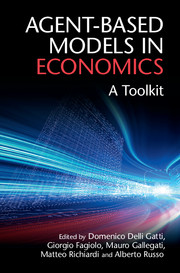Book contents
- Frontmatter
- Dedication
- Contents
- List of Figures
- List of Tables
- List of Contributors
- Preface
- 1 Introduction
- 2 Agent-Based Computational Economics: What, Why, When
- 3 Agent-Based Models as Recursive Systems
- 4 Rationality, Behavior, and Expectations
- 5 Agents’ Behavior and Learning
- 6 Interaction
- 7 The Agent-Based Experiment
- 8 Empirical Validation of Agent-Based Models
- 9 Estimation of Agent-Based Models
- 10 Epilogue
- Bibliography
- Index
Preface
Published online by Cambridge University Press: 02 March 2018
- Frontmatter
- Dedication
- Contents
- List of Figures
- List of Tables
- List of Contributors
- Preface
- 1 Introduction
- 2 Agent-Based Computational Economics: What, Why, When
- 3 Agent-Based Models as Recursive Systems
- 4 Rationality, Behavior, and Expectations
- 5 Agents’ Behavior and Learning
- 6 Interaction
- 7 The Agent-Based Experiment
- 8 Empirical Validation of Agent-Based Models
- 9 Estimation of Agent-Based Models
- 10 Epilogue
- Bibliography
- Index
Summary
As Schumpeter pointed out long ago, conceptual frameworks, models and policy prescriptions are embedded in the economist's ‘preanalytic vision’ of the economy. And preanalytic visions have been, and still are, very different in the profession.
Nowadays the majority of the profession embraces the neoclassical approach to economic behaviour, according to which agents are endowed with substantial rationality, adopt optimal rules and interact indirectly through the price vector on markets which are continuously in equilibrium. This approach has been extraordinarily fruitful, as it has allowed economists to build models that can be solved analytically and yield clear-cut policy implications. The obvious case in point is Walras's theory of General Equilibrium, beautifully outlined in his Elements d'Economie Politique, and elegantly extended and refined by Arrow and Debreu. Moreover, the approach has been remarkably flexible. Appropriately designed variants of the neoclassical approach have been applied to economies characterised by imperfect competition, imperfect information, strategic interaction, and heterogeneous agents. The most insightful of these theoretical developments have been incorporated in microfounded macroeconomic models of the New Neoclassical Synthesis that have been all the rage during the years of the Great Moderation.
However, the capability of the neoclassical approach to encompass and explain all the complex details of economic life has reached a limit. For instance, it is now abundantly clear that the neoclassical approach is not wellsuited to describe the Global Financial Crisis and the Great Recession. In models that follow the New Neoclassical Synthesis, in fact, a great recession may be explained only by a large aggregate negative shock, whose probability is extremely low (i.e., it is an extreme and rare event). This mechanism does not clarify much of the crisis and does not help to devise appropriate remedies.
The current predicament, both in the real world and in the public debate, resembles the early 1930s. The way out of the Great Depression required a new economic theory and the Second World War.1 Luckily, in order to escape the current predicament, we can dispense at least with the latter. We still need, however, to reshape the way in which we think about the economy.
For several years now, a complexity approach has been developed which conceives the economy as a complex system of heterogeneous interacting agents characterised by limited information and bounded rationality. In this view, a ‘crisis’ is a macroscopic phenomenon which spontaneously emerges from the web of microscopic interactions.
- Type
- Chapter
- Information
- Agent-Based Models in EconomicsA Toolkit, pp. xvii - xviiiPublisher: Cambridge University PressPrint publication year: 2018



